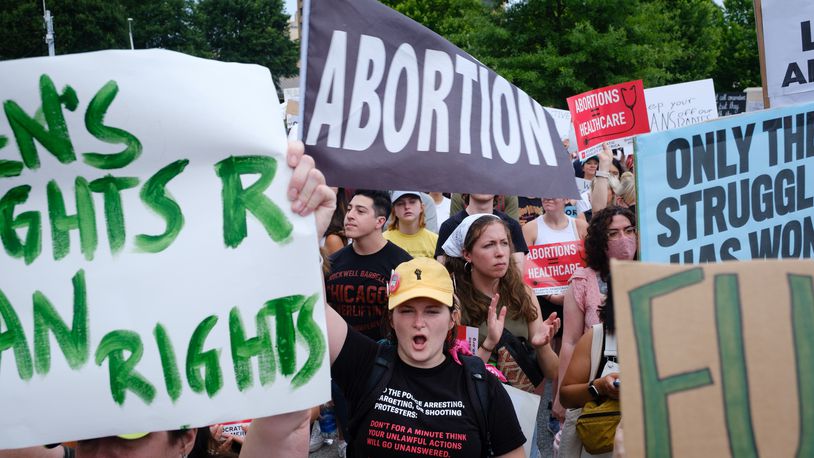
Chloe Hultman attends an abortion rights rally at the Georgia Capitol on Friday, June 24, 2022. The protest follows the Supreme Court’s overturning of Roe v Wade. (Arvin Temkar / arvin.temkar@ajc.com)
By Maya T. Prabhu
A federal appeals court on Wednesday allowed Georgia’s restrictive abortion law to take effect, an outcome that’s been expected since the U.S. Supreme Court in June overturned Roe v. Wade, which had guaranteed a constitutional right to abortion for nearly 50 years.
The panel of appeals judges sent the case back to a federal district judge and instructed him to reverse his 2020 ruling and allow the law to take effect. In a follow-up order, the panel lifted the district judge’s ban, allowing the law to take effect immediately.
“We vacate the injunction, reverse the judgment in favor of the abortionists, and remand with instructions to enter judgment in favor of the state officials,” Chief Judge Bill Pryor of the 11th U.S. Circuit Court of Appeals wrote in his order.
That means most abortions are no longer allowed once a doctor can detect fetal cardiac activity, typically about six weeks into a pregnancy and before many women know they are pregnant.
“Today, our arguments have prevailed, meaning the Eleventh Circuit has allowed Georgia’s (abortion law) to take effect immediately,” Attorney General Chris Carr said in a statement.
Gov. Brian Kemp told reporters he was “overjoyed” by the decision. He said health care providers are ready to give mothers “the resources they need to be safe, healthy and informed.”
Attorneys debating Georgia’s law were given three weeks after the U.S. Supreme Court’s June decision in Dobbs v. Jackson Women’s Health Organization to present additional arguments to the court before it made its ruling. Those were filed Friday.
The SisterSong Women of Color Reproductive Justice Collective and other abortion rights groups and providers sued Georgia in 2019 after the Legislature passed the law outlawing abortions once a doctor can detect fetal cardiac activity.
”The women and families of Georgia deserve better,” SisterSong Executive Director Monica Simpson said. “We all deserve better. No matter how long it takes, we are here in this battle until everyone has full bodily autonomy.”
In September, the three-judge appeals panel put the challenge to Georgia’s law on hold, deciding to wait for the U.S. Supreme Court’s ruling in the Dobbs case out of Mississippi.
In July 2020, U.S. District Judge Steve Jones struck down the Georgia law, leading to the appeal. At the time, Jones found the law violated a woman’s right to an abortion as established by the precedent set in Roe v. Wade.
All the judges on the three-judge panel were appointed by Republican presidents. Two of them were among then-President Donald Trump’s finalists in filling U.S. Supreme Court vacancies: Pryor, appointed by President George W. Bush, and Judge Barbara Lagoa, a Trump appointee.
The third judge on the panel, Harvey Schlesinger, a senior U.S. district judge from Jacksonville, Florida, was appointed by President George H.W. Bush.
Martha Zoller, executive director of the Georgia Life Alliance, said the state has now cleared an important hurdle. Her organization was one of the anti-abortion groups that worked to pass the 2019 legislation.
“This is another step on the way to a post-Roe Georgia and we are ready,” Zoller said.
The new law in Georgia allows abortions in cases of rape, incest, if the life of the woman is in danger or in instances of “medical futility,” when a fetus would not be able to survive. A police report is required in order to obtain a later abortion if the pregnancy is caused by rape or incest.
Once the Supreme Court ruled in the Mississippi case, it was always likely the Georgia law would be upheld. The only question was when and how.
Attorneys for the American Civil Liberties Union of Georgia, who sued the state on behalf of abortion rights advocates and providers, called the recent rulings on abortion “shameful.”
“It is horrifying that extremist politicians and judges have forced pregnant people and their health care providers into this nightmare,” said Julia Kaye, staff attorney for the ACLU Reproductive Freedom Project. “We’ll continue using every tool at our disposal to fight for abortion access in Georgia and across the country so that everyone has the power to decide if and when to have a child.”
Georgia’s new law is different from other states’ “heartbeat” statutes because it includes so-called personhood provisions, extending rights to an embryo once fetal cardiac activity can be detected. Parents would be able to claim a fetus, once a heartbeat is detected, on their state income taxes as a dependent, and the measure would also require state officials to count an unborn child toward Georgia’s population. Mothers can also file for child support once cardiac activity is detected.
Since the appeals court ruled that Georgia’s law should take effect, state agencies — such as the Department of Revenue, the Division of Child Support Services and the Georgia State Patrol — will have to figure out how to uphold and enforce those personhood provisions.
The appeals court order differs from a ruling earlier this month from a federal judge in Arizona who blocked that state’s 2021 “personhood” law that gave legal rights to an embryo upon conception. The judge there said the law was unconstitutionally vague and left providers and patients guessing about what laws they could be breaking if an embryo has the rights of any citizen.
Staff writer Greg Bluestein contributed to this article.
Read the original story on AJC.com.











